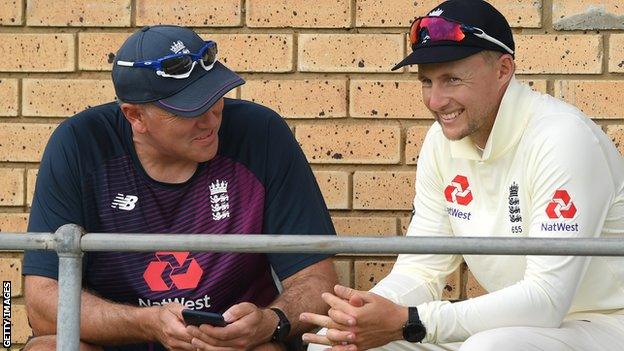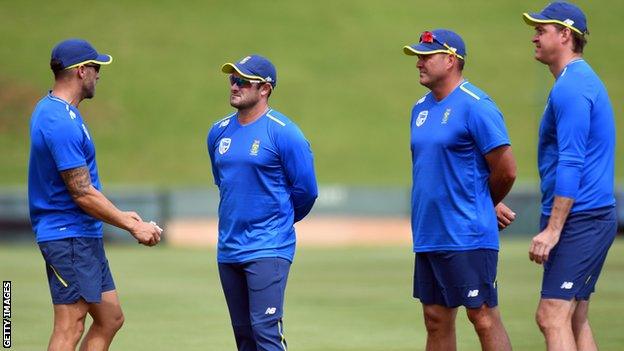South Africa v England: Tourists need to show intelligence, says Jonathan Agnew
- Published

England coach Chris Silverwood and captain Joe Root make plans in South Africa
A couple of weeks ago, it looked as if it was a very good time for England to be playing South Africa.
Cricket South Africa was in chaos, players were in dispute with the higher-ups over commercial rights, a major sponsor withdrew its support and the accreditation of five respected journalists was revoked because administrators weren't happy with how they were covering all of the shenanigans.
Now, even if everything isn't totally fixed, the fact that legends such as Graeme Smith, Mark Boucher and Jacques Kallis are involved with the Test side should give the Proteas a boost.
As interim director of cricket, Smith will expect the commitment and desire he exhibited as a player. Boucher, the coach, and Kallis, the batting consultant, will command huge respect. The South Africa dressing room has certainly been given a lift.
However, those men cannot go out and play and, without old warriors such as AB de Villiers, Hashim Amla and Dale Steyn, South Africa are in a period of transition.
That is one of the reasons I expect England to win the four-Test series that begins in Centurion on Boxing Day.
However, the tourists will have to deal with their own issues, not least the illness that has disrupted preparations.
Stuart Broad, Jofra Archer and Jack Leach have done next to nothing after suffering from flu-like symptoms. The second of the two warm-up games had to be downgraded from first-class status to allow England to field more than 11 players because of illness in the camp. Dom Bess and Craig Overton have been flown in as cover. It is far from ideal.
Perhaps it isn't surprising that this sort of thing has struck the England side, especially with the coughs and colds going around the UK at the moment.
Not only that, but the players are made vulnerable by the amount of travelling they have been doing in such a short space of time.
On 13 December, I was at a Professional Cricketers' Association lunch that served as a farewell for the squad heading to South Africa. Half of the team were still jet-lagged after their journey back from New Zealand.
Still, regardless of the challenges they face, England will have to be ready for the first Test and that includes learning the lessons of the 1-0 series loss to the Black Caps.
I want to see them play intelligent Test cricket. They went to New Zealand saying they were going to do just that and, even though they got better in the second Test, overall it wasn't quite right.
It comes down the approach and England sometimes fall into a 'one-size-fits-all' mentality.
Just over a year ago in Sri Lanka, they talked about being aggressive, which led to everyone playing their shots. It almost cost them in the first Test.
Then in New Zealand, they talked about occupying the crease. That's fine, but they pretty much took it too far the other way.
In the first Test, in which they were defeated, they weren't busy enough in the first innings, lost a clatter of wickets and were left with a total that wasn't good enough.
Some people will disagree with this view, but you can be both proactive and careful at the same time. Yes, leave the ball alone. Yes, make the bowler come to you. But also push the singles, find the gaps and rotate the strike. It is about finding a balance.
Joe Root understands that and he is in a much better place for scoring a double hundred in the second Test in New Zealand. Now, after what was a pretty barren patch, the captain can concentrate on getting results.
Rory Burns also impressed with another showing of his determination and doggedness, making a century in support of Root.

Mark Boucher (second left) was named South Africa coach on 14 December
However, there was not a great deal else that England learned on that tour.
New opener Dom Sibley was shown to have work to do, once again highlighting the big jump between county cricket and the Test game. He clearly works very hard, but has a technique that has him shuffling across his stumps and working the ball on the leg side. He will be tested by skilful bowlers probing on off stump.
New Zealand was a difficult tour for Archer, but South Africa raises the tantalising prospect of him joining forces with the fit-again James Anderson for the first time.
If Archer and Broad can recover from their illness to line up alongside Anderson, it will fulfil the wishes of fans who have wanted to see them play as a trio since Archer qualified to represent England.
In that, though, comes the decision of how England best set up their attack. In the second Test in New Zealand, we were left with the unsatisfactory option of five pace bowlers. Generally, you always want to have a spinner, but there is a bit more to it than that.
If they want to get the best out of him, England should only be bowling Archer in short spells. They also are trying to protect Ben Stokes' knee and will be wary of Anderson's fitness after how he pulled up in the first Ashes Test.
Managing three bowlers is tricky, so you can see why England might again see the need to go exclusively with pace, especially given the nature of South African pitches.
You could ask about the lack of variety, but England will feel that Archer, Broad, Anderson and the left-armed Sam Curran all pose different questions.
It may be that the fitness - or lack of fitness - of spinner Leach answers the question for them.
South Africa is a good place to watch cricket. It will be hot and sunny, the pitches will have a bit in them and the Cape Town Test has become something of a new year event for travelling England fans. I expect to see plenty of them there.
England should win the series, but only if they play proper, hard, disciplined Test cricket.
Jonathan Agnew was talking to BBC Sport's Stephan Shemilt